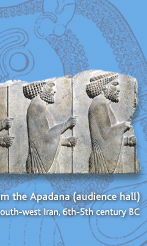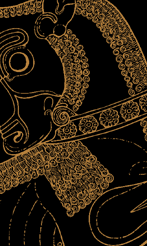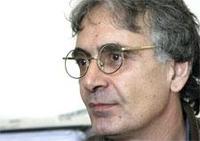 New Exhibition In British Museum
New Exhibition In British Museum
Revisiting Ancient Persian Empire
http://www.thebritishmuseum.ac.uk/
What urged John Curtis, Keeper of the Ancient Near East department at the British Museum to prepare the exhibition of "Forgotten Empire" was the release of the movie "Alexander" by Oliver Stone in which Iranians were portrayed as Berbers who only found the true meaning of freedom after the assault of Alexander.
"We have tried to provide a real image of ancient Persia. According to historical documents, Persians were pacifist and showed a great tolerance in their encounter with foreign beliefs and religions," says Curtis, adding that the main theme of the exhibition has been peace, tranquility, peaceful co-existence, self-respect, and respect for different religions. http://www.payvand.com/news/05/sep/1188.html

The movie Alexander is a symbol of lack of education on Ancient Persian Empire in Europe. European still see and ancient history as history of Ancient Greece. Such an exhibition made Greece Lovers unhappy and they criticized the exhibition. The organizers of the exhibition , of cource expected more critics and complains: http://www.chn.ir/news/?Section=2&id=25112
The publication of an article in Guardian encouraged letters by Shahrokh Razmjou, head of the Centre for Achaemenid Studies, National Museum of Iran, and by Abbas Alizadeh, Iranian archaeologist from Chicago University.
The critic titled "The Evil Empire" was publishid in Guardian. It calls Persia's kings history's great villains. The writer, Jonathan Jones asks: Does the British Museum's show do them justice? Here is his article (--Siamak D. Ahi):
 The title of this exhibition is a bit misleading. Forgotten Empire, the British Museum calls its spectacular resurrection of ancient Persia. Yet the Persians are as notorious in their way as Darth Vader, the Sheriff of Nottingham, General Custer, or any other embodiment of evil empire you care to mention. They are history's original villains.
The title of this exhibition is a bit misleading. Forgotten Empire, the British Museum calls its spectacular resurrection of ancient Persia. Yet the Persians are as notorious in their way as Darth Vader, the Sheriff of Nottingham, General Custer, or any other embodiment of evil empire you care to mention. They are history's original villains. In its day, which lasted from the middle of the 500s BC until the defeat of Darius III by Alexander the Great in 331 BC, the Persian empire ruled a vast portion of the then-known world from the Nile to the Indus. It connected the Mediterranean with modern Afghanistan. Rich beyond dreams, powerful beyond dispute, the great kings ruled from their mighty palaces at Susa and Persepolis, tolerating the religions and cultures of subject peoples and harvesting the creativity of near eastern civilisation that had already, before they came along, invented writing and urban life. It should have been enough to earn them historical immortality.
Yet, of course, the leader whose name resonates down the ages is Alexander the Great. The Persian kings, from their lofty thrones, perceived the turbulent islands on the western fringe of the empire as a marginal irritant, and yet the Greeks were their nemesis. For the Persians had the misfortune to be the others, the enemies - in short, the Orientals - against whom the first European civilisation defined itself.
The Middle East invented writing, but ancient Greece invented history. Herodotus, "the father of history", takes as his epic theme the struggle of the Greek city states against the vast Persian empire - and sees it as a war of liberation. The idea of democracy was born in the fight against Persian despotism: that is how Herodotus tells it. The Persian king Xerxes is the supreme overlord of all baddies, turning his eye on the plucky little Greek cities who, unexpectedly, fight back. Now you remember the Persians: the guys with the strange beards whom the Athenians beat at Marathon. Until Marathon, says Herodotus, "no Greek could even hear the word Persian without terror". In finding the courage to fight Persia, the Greeks discovered their own identity as citizens.... http://www.guardian.co.uk/arts/features/story/0,,1564733,00.html
 Persia was not an Evil Empire
Persia was not an Evil Empire "We should not judge a civilisation solely on the words of its enemies", says Shahrokh Razmjou who wrote an answer to Guardian with the title "Persia was not an evil empire". He writes:
I was very disappointed by the article by Jonathan Jones (Evil empire, September 8). Jones claimed that Persia's kings are history's great villains and the Persian empire was as grandiose, luxurious and despotic as Herodotus said it was.
It is always dangerous to view history from one point of view, and it is surely not right that the Persian civilisation is compared to Darth Vader and its achievements regarded as evil.
The article took a strongly propagandist and Hellenocentric view and exaggerated the idea of a clash between Persian and Greek civilisation which, in my view, is a modern fabrication.......
http://www.guardian.co.uk/comment/story/0,,1575231,00.html
 Evil Empire or Evil Intentions
Evil Empire or Evil IntentionsAbbas Alizadeh, Iranian archaeologist from Chicago University, responds to Guardian article. He questions the knowledge of writer and his "political agenda". He writes:
Reading Mr. Jonathan Jones’ article, “The evil empire,” in your reputable newspaper (Guardian - 9/10/05) one is left with the feeling that Mr. Jones knows very little, if any, about history, art history, and archaeology. In fact, on a par with the title of the article, he immediately reveals his political agenda in his first paragraph and continues his political ramble in a thinly wrapped critique of the British Museum’s ongoing exhibition of Persian Achaemenid “Forgotten Empire.” Lest readers may be ambiguous about Persia, he duly reminds them that it is the same as Iran.
This is unfortunate because at this critical time when the polarization of the world is increasingly becoming nasty, ugly, and dangerous, Mr. Jones’ article would simply serve as fodder to the attitude that in part has been responsible for today’s geopolitical quagmire we are witnessing now.... http://www.chn.ir/en/news/?id=5660§ion=2
